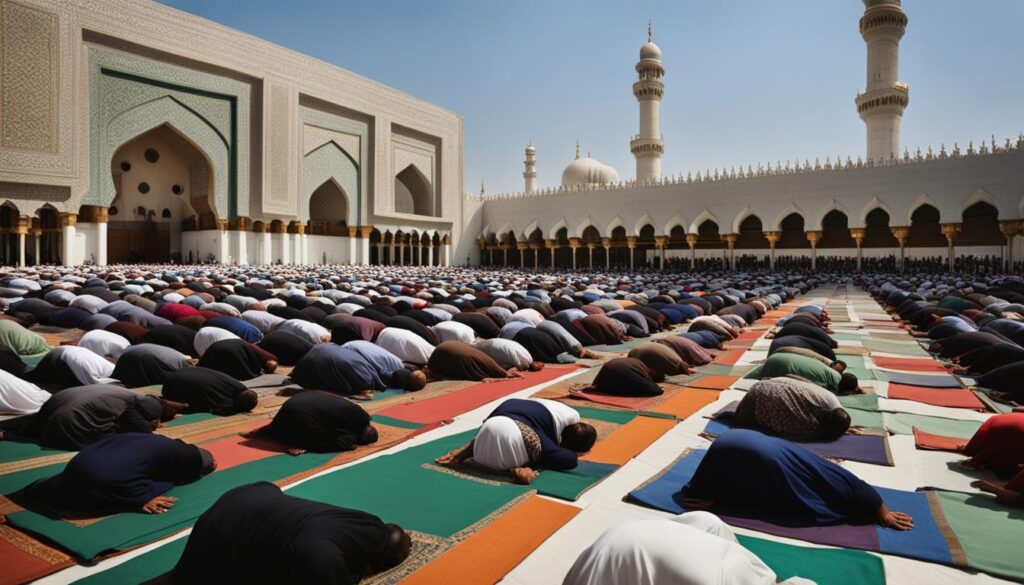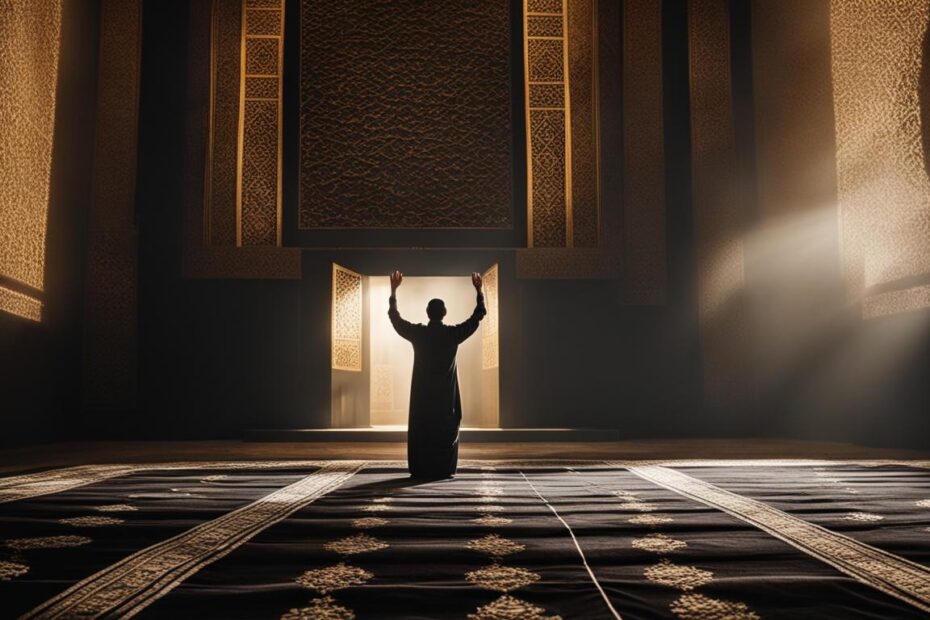Welcome to our comprehensive guide on Islamic Salah, also known as Muslim prayer. In this guide, we will delve into the importance of Salah and provide step-by-step instructions on how to perform the five daily prayers. Whether you are new to Islam or looking to deepen your understanding, this guide will equip you with the knowledge and guidance you need to engage in meaningful prayer.
Key Takeaways:
- Islamic Salah, or Muslim prayer, is a fundamental aspect of the Islamic faith.
- Performing the five daily prayers is of utmost importance for spiritual growth and establishing a strong connection with Allah.
- Properly performing Salah involves following specific rituals and steps, such as making wudu (ablution) and reciting specific prayers.
- Each of the five daily prayers has its designated time and unique rituals.
- Regularly performing Salah brings numerous benefits, including spiritual, physical, and mental well-being.
The Purpose of Islamic Salah and Its Significance
Islamic Salah, also known as Muslim prayer, serves a profound purpose in the lives of Muslims and holds great significance in the Islamic faith. It is not merely a ritualistic act but a means of worshiping Allah and fulfilling the purpose for which Muslims believe they were created.
Through Salah, Muslims establish a direct connection with the Creator, seeking spiritual growth and guidance in their lives. It is a time of reflection, humility, and surrender to the will of Allah. The act of prayer helps Muslims align their hearts and minds with the divine, fostering a deep sense of devotion and devotion.
Salah is not limited to a mere physical act of bowing and prostrating; it encompasses a holistic approach to spirituality. It serves as a reminder of the ultimate purpose of life and the transient nature of worldly pursuits. In the words of the Prophet Muhammad (peace be upon him), “When you stand up to pray, pray as if it is your last prayer.”
The purpose of Islamic Salah is to establish a connection with Allah, seek spiritual growth, and find solace in the remembrance of the Creator. It is a transformative act that nourishes the soul, purifies the heart, and strengthens the bond between the individual and Allah.
The Significance of Salah for Spiritual Growth
Salah is integral to spiritual growth in Islam. It provides an opportunity for self-reflection, mindfulness, and seeking forgiveness. Through the daily practice of prayer, Muslims strive to increase their awareness of the divine presence and purify their souls from negative influences and distractions.
The act of prostration in Salah symbolizes complete submission to Allah, acknowledging His greatness and seeking His guidance. It is a moment of humility and surrender, allowing individuals to experience inner peace and tranquility. The regular performance of Salah helps in cultivating spiritual discipline and mindfulness in all aspects of life.
Furthermore, Salah acts as a spiritual anchor during challenging times, reminding individuals of Allah’s mercy, love, and guidance. It provides solace, comfort, and strength to face the trials of life. The practice of Salah nurtures a deep sense of gratitude, contentment, and reliance on Allah, fostering spiritual growth on an ongoing basis.
In conclusion, Islamic Salah serves a vital purpose in the lives of Muslims, enabling them to establish a profound connection with Allah, seek spiritual growth, and find solace in the remembrance of the Creator. It is a transformative act that nourishes the soul, purifies the heart, and strengthens the bond between the individual and Allah. By embracing Salah as a daily practice, Muslims can experience deep spiritual fulfillment and embark on a journey of self-discovery and inner peace.

The Rituals and Steps of Islamic Salah
In order to perform Islamic Salah, Muslims must follow a set of rituals and steps. These include making wudu (ablution), facing the Qibla (direction of Mecca), reciting specific prayers (such as Surah Al-Fatiha), and assuming different positions (such as standing, bowing, prostrating). It is essential to perform each step correctly and with reverence, as Salah is a form of worship and a means of connecting with Allah.
The first step in preparing for Salah is making wudu. This involves washing the hands, mouth, nose, face, arms, and feet. It is important to cleanse each body part thoroughly and in the correct order. Wudu symbolizes purification and is an act of spiritual cleansing before engaging in prayer.
Once wudu is completed, the next step is to find a clean and quiet place to pray. Muslims should face the Qibla, which is the direction of the Kaaba in Mecca. It is important to ensure the proper alignment of the body towards the Qibla, as it signifies unity and submission to Allah.
The next step is to recite specific prayers, starting with the Takbir, which is the declaration of the greatness of Allah. Following the Takbir, Muslims recite Surah Al-Fatiha, the opening chapter of the Quran, and other verses or chapters of their choice. These recitations add depth and meaning to the Salah and help to focus the mind and heart on Allah.
After reciting the chosen verses, Muslims assume different positions during Salah. These positions include standing, bowing (Ruku), prostrating (Sujood), sitting, and reciting additional prayers. Each position is accompanied by specific supplications and actions, all performed with humility and concentration.

Understanding the Five Daily Salah
Islamic Salah, or Muslim prayer, consists of five daily prayers that are performed at specific times throughout the day. These prayers are known as Fajr, Dhur, Asr, Maghrib, and Isha. Each prayer has its own unique significance and rituals, allowing Muslims to connect with Allah and seek His blessings. Let’s take a closer look at each of these prayers and their importance in the Islamic faith.
Fajr Prayer
The Fajr prayer is performed before sunrise, marking the beginning of the day. It is a time when the world is still quiet and peaceful, providing an opportunity for worshippers to start their day with devotion and gratitude. This prayer consists of two units (rak’ahs) and includes specific recitations from the Quran.
Dhur Prayer
The Dhur prayer is offered in the afternoon, after the sun has passed its zenith. It is a time to pause from the busyness of daily life and seek spiritual rejuvenation. The Dhur prayer consists of four units and holds great importance in maintaining a connection with Allah throughout the day.
Asr Prayer
The Asr prayer is performed in the late afternoon, before sunset. It serves as a reminder for Muslims to take a break from their worldly engagements and turn their focus towards Allah. The Asr prayer consists of four units and is a time for self-reflection and seeking forgiveness.
Maghrib Prayer
The Maghrib prayer is offered immediately after sunset. It is a time to express gratitude for the blessings of the day and seek forgiveness for any shortcomings. The Maghrib prayer consists of three units and is an opportunity to reflect on one’s actions and seek Allah’s mercy.
Isha Prayer
The Isha prayer is performed after twilight has completely disappeared. It is the final prayer of the day and holds great importance in concluding the daily acts of worship. The Isha prayer consists of four units and allows Muslims to seek forgiveness, guidance, and blessings from Allah before retiring for the night.
Understanding the five daily prayers in Islam is essential for practicing Muslims. Each prayer has its own unique rituals and significance, allowing individuals to establish a deeper connection with Allah and seek His blessings throughout the day. By performing these prayers sincerely and regularly, Muslims are able to cultivate a stronger faith and spiritual growth.
| Prayer | Time of Day | Number of Rak’ahs |
|---|---|---|
| Fajr | Before sunrise | 2 |
| Dhur | After midday, before sunset | 4 |
| Asr | Afternoon, before sunset | 4 |
| Maghrib | After sunset | 3 |
| Isha | After twilight | 4 |
The Importance of Wudu (Ablution) in Islamic Salah
The ritual of Wudu, or ablution, holds great significance in Islamic Salah. It is a prerequisite for performing the five daily prayers and symbolizes the purification of the body and soul before engaging in prayer. Wudu involves washing specific body parts with clean water, including the hands, face, arms, and feet. By performing Wudu, Muslims cleanse themselves physically and spiritually, preparing for a direct connection with Allah.
The importance of Wudu can be understood from a hadith (saying) of the Prophet Muhammad (peace be upon him). He said, “When a Muslim performs Wudu and washes his face, then every sin he committed with his eyes will be washed away with the water or with the last drop of water. When he washes his hands, then every sin they participated in will be washed away with the water or with the last drop of water. When he washes his feet, then every sin they committed will be washed away with the water or with the last drop of water, until he comes out pure from sins.” This hadith highlights the spiritual cleansing and forgiveness associated with the act of Wudu.
Furthermore, Wudu helps in focusing the mind and enhancing concentration during Salah. The physical actions involved in Wudu, such as washing the face and limbs, serve as a form of mindfulness, allowing individuals to detach from worldly distractions and center their thoughts on prayer. Additionally, the act of Wudu is a means of cultivating discipline and self-control, as Muslims must perform it correctly and in accordance with the teachings of Islam.
In conclusion, Wudu plays a vital role in Islamic Salah. It serves as a physical and spiritual purification process, allowing individuals to connect with Allah and engage in prayer with a focused mind and a purified heart. By understanding the importance of Wudu and performing it diligently, Muslims can enhance their worship and experience the true essence of Salah.
Common Mistakes to Avoid in Islamic Salah
Performing Islamic Salah requires precision and adherence to specific rituals and steps. However, it is not uncommon for individuals, especially beginners, to make mistakes during the prayer. Understanding and correcting these mistakes is essential to ensure the validity and acceptance of Salah. Here are some common Salah errors to be aware of:
- Lack of focus: One of the most common mistakes is a lack of concentration during Salah. It is important to be mentally present and focused on the prayer, avoiding distractions and worldly thoughts.
- Incorrect positioning: Another common error is incorrect positioning of the body during different stages of Salah. This includes not standing straight, not bowing and prostrating properly, and not maintaining the appropriate posture throughout the prayer.
- Inaccurate recitation: Mispronunciation or incorrect recitation of the verses and supplications during Salah is also a common mistake. It is important to learn and recite the necessary prayers correctly, paying attention to the pronunciation and meaning of the words.
- Rushed prayer: Many individuals rush through their Salah, neglecting the importance of taking the time to connect with Allah. It is important to perform Salah at a moderate pace, allowing for moments of reflection and tranquility.
Correcting these mistakes is crucial to ensure the sincerity and effectiveness of Salah. Beginners should seek guidance from knowledgeable individuals, such as imams or experienced Muslims, who can provide proper instruction and advice. Additionally, consistent practice and self-reflection are key to improving Salah performance and avoiding these common errors.
Importance of Correcting Salah Mistakes
“Verily, Allah accepts only from the righteous.” – Surah Al-Ma’idah [5:27]
Correcting Salah mistakes is not only important for the validity of the prayer, but it also reflects one’s commitment and reverence towards Allah. By striving to improve Salah performance and rectify errors, individuals demonstrate their sincerity and dedication to the worship of Allah. Correctly performing Salah enhances the spiritual experience and strengthens the connection with the Creator.
Regular self-evaluation and seeking knowledge are essential in identifying and correcting Salah mistakes. By doing so, individuals can establish a fulfilling prayer routine that is pleasing to Allah and brings about a sense of peace and tranquility.
The Role of Salah in the Quran and Hadith
The practice of Salah holds a significant place in the Islamic faith, as it is mentioned in various verses of the Quran and narrations from the Hadith, the teachings and actions of the Prophet Muhammad (peace be upon him). Both sources emphasize the importance of Salah and its role in the life of a Muslim.
The Quranic Perspective on Salah
In the Quran, Salah is repeatedly mentioned as an essential act of worship and a means of seeking guidance and closeness to Allah. One of the most notable verses highlighting the significance of Salah is found in Surah Al-Baqarah:
“And establish prayer and give zakah and bow with those who bow [in worship and obedience].” (Quran 2:43)
This verse emphasizes the obligation of performing Salah and the importance of congregational prayer. Throughout the Quran, Salah is mentioned in various contexts, emphasizing its role in seeking guidance, seeking forgiveness, and seeking protection from evil.
The Hadith Perspective on Salah
The Hadith also contain numerous teachings of the Prophet Muhammad (peace be upon him) regarding Salah. The Prophet (peace be upon him) emphasized the importance of offering Salah regularly and with devotion. One of his famous sayings regarding Salah is:
“Pray as you have seen me praying.” (Sahih Al-Bukhari)
This Hadith highlights the importance of following the example of the Prophet (peace be upon him) in performing Salah. The Hadith literature also contains detailed descriptions of the Prophet’s (peace be upon him) actions, words, and teachings regarding Salah, providing further guidance to Muslims.
| Benefits of Salah in Daily Life | References |
|---|---|
| Strengthening faith and spirituality | Quran 29:45 |
| Seeking forgiveness and mercy | Quran 110:3 |
| Developing discipline and self-control | Sahih Al-Bukhari, Hadith 527 |
| Seeking guidance and clarity in decision-making | Quran 2:45 |
Through the Quran and Hadith, Muslims are guided to understand the importance of Salah and its role in their lives. It serves as a means of connecting with Allah, seeking guidance, and fostering spiritual growth. By performing Salah regularly and with sincerity, Muslims strive to live a life in accordance with the teachings of Islam.
The Benefits of Regularly Performing Islamic Salah
Regularly performing Islamic Salah offers a range of benefits that contribute to an individual’s overall well-being. From spiritual growth to physical and mental health, the practice of Salah has a profound impact on various aspects of a person’s life.
1. Spiritual Benefits
Islamic Salah is a means of establishing a strong connection with Allah and nourishing one’s spirituality. The act of prayer allows individuals to express gratitude, seek forgiveness, and seek guidance from the Almighty. It serves as a reminder of the ultimate purpose of life and offers a sense of peace and tranquility in the midst of daily challenges.
2. Physical Benefits
Performing the physical movements and postures of Salah, such as standing, bowing, and prostrating, has physical benefits as well. These movements help improve flexibility, strengthen muscles, and enhance blood circulation. Regular prayer can contribute to better posture and overall physical fitness.
3. Mental Benefits
Engaging in regular Salah has positive effects on mental health. The act of prayer provides a sense of discipline, routine, and focus, which can help reduce stress and anxiety. It offers a moment of peace and mindfulness, allowing individuals to center their thoughts and find solace in the presence of Allah.
Overall, regularly performing Islamic Salah brings numerous benefits to individuals, encompassing their spiritual, physical, and mental well-being. It is a practice that not only strengthens the bond with the Creator but also fosters self-reflection and personal growth.
| Benefits of Salah | Spiritual Benefits | Physical Benefits | Mental Benefits |
|---|---|---|---|
| Establishes a strong connection with Allah | Improves flexibility and strengthens muscles | Reduces stress and anxiety | |
| Provides a sense of peace and tranquility | Enhances blood circulation | Offers a moment of mindfulness | |
| Facilitates self-reflection and personal growth | Contributes to better posture |
Regularly performing Islamic Salah brings significant benefits to individuals, promoting their spiritual, physical, and mental well-being. The practice of Salah is not only a religious duty but also a means of finding solace, building discipline, and experiencing personal growth. By embracing Salah, individuals can nurture their connection with Allah, enhance their physical fitness, and cultivate a sense of inner peace.
Conclusion
In conclusion, Islamic Salah is an essential aspect of the Islamic faith and holds great significance for Muslims. Through Salah, believers establish a strong connection with Allah and seek spiritual growth. The five daily prayers, Fajr, Dhur, Asr, Maghrib, and Isha, each have their designated times and specific rituals that must be followed.
Performing Salah requires following a set of rituals and steps, such as making wudu (ablution) and reciting specific prayers. It is important to avoid common mistakes during Salah to ensure the validity and acceptance of the prayer. References to Salah can be found in the Quran and Hadith, further emphasizing its importance in Islam.
Regularly performing Salah brings numerous benefits, including spiritual, physical, and mental well-being. By engaging in meaningful prayer, individuals can experience a profound impact on their overall well-being and foster a closer relationship with Allah. This comprehensive guide has provided beginners with the necessary knowledge and guidance to understand and practice Islamic Salah.
FAQ
What is Islamic Salah?
Islamic Salah, also known as Muslim prayer, is a means of worshiping Allah and fulfilling the purpose for which Muslims believe they were created.
Why is Salah important in Islam?
Salah is important in Islam as it establishes a strong connection with the Creator and allows Muslims to seek spiritual growth.
How do I perform Islamic Salah?
To perform Islamic Salah, you must follow a set of rituals and steps, such as making wudu (ablution), facing the Qibla (direction of Mecca), reciting specific prayers, and assuming different positions.
What are the five daily prayers in Islam?
The five daily prayers in Islam are Fajr, Dhur, Asr, Maghrib, and Isha. Each prayer has its designated time and specific rituals.
What is the importance of Wudu in Islamic Salah?
Wudu, or ritual purification, is important in Islamic Salah as it symbolizes purity and prepares the individual for engaging in prayer.
What are common mistakes to avoid in Islamic Salah?
Common mistakes to avoid in Islamic Salah include improper recitation, rushing through the prayer, and not observing the proper positions and movements.
Where is Salah mentioned in the Quran and Hadith?
Salah is mentioned in various verses of the Quran and narrations from the Hadith, further emphasizing its significance in the Islamic faith.
What are the benefits of regularly performing Islamic Salah?
Regularly performing Islamic Salah brings benefits such as spiritual growth, a closer relationship with Allah, and positive effects on one’s physical and mental well-being.








